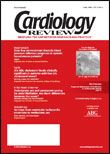News from the Heart Failure Society of America's Annual Scientific Meeting, September 16-19, 2007, Washington, DC.
Tolvaptan causes favorable hemodynamic changes
A single dose of the vasopressin receptor antagonist tolvaptan led to increased urine output and favorable hemodynamic changes in patients with advanced heart failure taking part in the Effect of Tolvaptan on Hemodynamic Parameters in Subjects with Heart Failure (ECLIPSE) trial.This research was presented at the late-breaking trials symposium of the Heart Failure Society of America's Annual Scientific meeting, September 16-19, 2007, in Washington, DC.
Tolvaptan is an investigational drug currently under study as a potential treatment for fluid rentention and hyponatremia related to heart failure, as well as for polycystic kidney disease. Phase 3 clinical trials have been completed and the manufacturer, Otsuka Pharmaceutical Group, is currently preparing a New Drug Application for the FDA.
The ECLIPSE trial enrolled 180 patients with symptomatic heart failure (New York Heart Association class III and IV) and randomized them to double-blind treatment with tolvaptan at a single oral dose of 15, 30, 60 mg or to placebo. The study's primary outcome variable was pulmonary capillary wedge pressure (PCWP), which estimates lung capillary pressure and the filling pressures on the left side of the heart.
P
All 3 doses of tolvaptan examined in the study significantly changed PCWP compared with placebo (tolvaptan 15 mg, -6.38 ± 0.62 mm Hg; tolvaptan 30 mg, -5.67 ± 0.70 mm Hg; tolvaptan 60 mg, -5.71 ± 0.65 mm Hg, placebo, -4.16 ± 0.67 mm Hg; versus placebo < .05 for each tolvaptan group).
P
P
Compared with placebo, each dose of tolvaptan significantly increased urine volume at 3 hours after dose was given ( < .001). Also, during the 3-8 hour interval after tolvaptan administration, mean reductions of the pressure in the pulmonary artery that carries venous blood from the right ventricle of the heart to the lungs, a secondary endpoint, were observed and were statistically greater ( < .05) in all tolvaptan groups than in the placebo group. Over the same time period, mean reductions in pressure within the heart's right atrium were also observed, and those were statistically greater in the tolvaptan 15 mg and 30 mg groups than in the placebo group. None of the other secondary outcome measures, including cardiac output, cardiac index, systemic vascular resistance, heart rate, and blood pressure, showed significantly different changes in the tolvaptan and placebo groups.
Overall, 77 (42.5%) subjects experienced at least 1 treatment-emergent adverse event during the trial. The incidence of these events was highest in the tolvaptan 60 mg group (54.3%) and lowest in the placebo group (33.3%). Most common adverse events (greater than 3% and more frequent than placebo) associated with tolvaptan were dry mouth, thirst, back pain, headache, anxiety, and haematuria. No treatment-emergent adverse event occurred in more than 10% of the patients in any of the groups. No deaths occurred during study drug administration. Two patients died during the 7-day follow-up period due to complications resulting from worsening of the underlying disease.
New Product News
FDA approves combination pill for hypertension treatment
The FDA has approved the once-daily, single-dose combination drug AZOR for hypertension treatment. AZOR is manufactured by Daiichi Sankyo, Inc, and combines the calcium channel blocker amlodipine with olmesartan medoxomil, the active ingredient in Benicar, an angiotensin receptor blocker also made by Daiichi Sankyo.
The combination of the two medicines relaxes blood vessels so that blood flows more easily. In clinical trials, AZOR produced significant mean reductions in seated systolic and diastolic blood pressure in patients with hypertension. In the registrational trial, AZOR 10/40 mg reduced systolic blood pressure an average of 30.1 mm Hg and the diastolic reading an average of 19.0 mm Hg. These results were in comparison with mean reductions of 19.7 mm Hg systolic/12.7 mm Hg diastolic for amlodipine 10 mg alone (placebo = 4.8/3.1 mm Hg). When compared with amlodipine 10 mg alone, AZOR 10/40 mg resulted in a 53% greater reduction in the mean change of systolic blood pressure.
AZOR is indicated for the treatment of hypertension, alone or with other antihypertensive agents. AZOR is not indicated for the initial therapy of hypertension and should not be used by pregnant women.
FDA approves loading dose formulation of antiplatelet medication
The FDA has approved a supplemental new drug application for a 300 mg tablet of clopidogrel bisulfate, an antiplatelet agent marketed as Plavix. The formulation is intended to facilitate the FDA-approved loading dose for appropriate acute coronary syndrome (ACS) patients as soon as possible after hospital admission.
Acute ST-segment elevation myocardial infarction, non-ST segment elevation myocardial infarction, and unstable angina are the 3 conditions comprising ACS, a major cause of emergency medical care and hospitalization in the United States.
Current treatment guidelines recommend a 300 mg loading dose of clopidogrel in conjunction with aspirin, but many appropriate ACS patients do not receive this loading dose, noted Marc Cohen, MD, in a press release of the announcement. Cohen is chief of the division of cardiology, and director of the Cardiology fellowship at the Newark Beth Israel Medical Center, Newark, NJ, and Professor of Medicine at the Mount Sinai School of Medicine, New York.
New product information should be sent to
.
